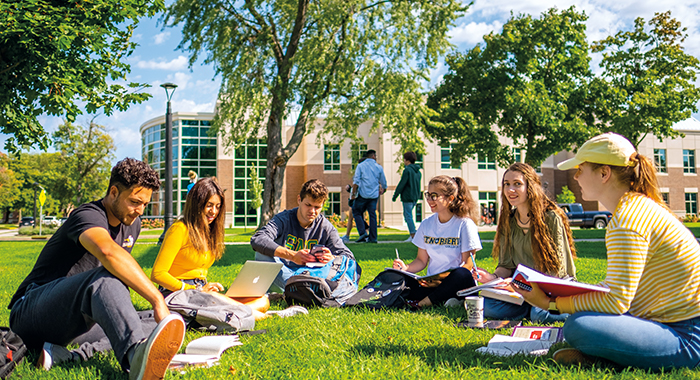Call to a Flourishing Future
With the 2019-20 academic year about to begin, the campus community responded to new calls to community from two dynamic and well-regarded speakers – one already well known to them, one visiting from the American Association of State Colleges & Universities (AASCU).
Keynoting the 33rd annual faculty development conference, Paul Wadell (Theology & RS, Emeritus) led his colleagues into a critical conversation about the college’s institutional and personal missions.
A theology of friendship
Wadell cited St. Augustine, whose theology of friendship held that friendship was relevant everywhere. In the community surrounding this early doctor of the church, the differences among his friends enriched their life together because they all did agree on what mattered. “Like any real community, it was an assortment of unique individuals that hardly agreed on anything,” Wadell said. “They were able to live together well because they were joined as one in what they took to be the fundamental calling of their lives.”
Wadell noted that SNC was the only Norbertine college in the world: “We have a story that does not belong to anyone else. We have the unique and compelling story that is worth remembering, and being told well. St. Norbert College is the place where real good can be done. This means from time to time we have to wrestle with the questions: What is it that St. Norbert College is especially called to do, and how do we do it best? What is its institutional vocation?”
It all came down, Wadell said, to the question of whether we were willing to risk, love, in every area of life – including at the college. If we were, then all of us would flourish. If we were, then we would be fully alive, bold and hopeful, even when things were hard, claimed Wadell. If we were, St. Norbert College would not just be a good place to be, but a holy place:
“It will be a holy place because no one will be overlooked, forgotten or taken for granted. It will be a holy place because no one will ever feel they are not welcome and will never feel like they don’t truly belong. It will be a holy place because everyone will feel listened to and respected, and affirmed. It will be a holy place because everyone, everyday, will be treated justly. It will be a holy place because love lives here.”
A fresh challenge
Later the same day, after the start-of-the year address from President Brian Bruess ’90, George Mehaffy of the AASCU challenged the community to consider its individual and collective roles in driving change at the college. He said, of colleges like SNC: “If I could change only one thing, I would change the way that we see this institution. I would beg each of you to see this institution through the eyes of the first-year students who arrive on campus – scared, uncertain, not clear why we’re here, not sure what all this means. And the number of students who will be that way will increase in the years to come as our population gets more diverse.”
As SNC launched “a year of renewal and refocusing” – a year that will see gathering momentum in the 2016-21 strategic plan and its new More Than Numbers initiative focused on the student experience – Bruess cued Mehaffy’s insights as particularly timely.
About the speakers
Paul Wadell joined the theology and religious studies discipline in 1998 and retired in May. His main areas of interest are Christian ethics and the theology of the church, and he has been fascinated for many years with the role of friendship in the Christian life. Among his many publications are “Friendship & the Moral Life” (1989) and “Becoming Friends: Worship, Justice & the Practice of Christian Friendship” (2002).
George Mehaffy has served as the vice president for academic leadership and change at the AASCU for 17 years. His 40 years of diverse experiences include more than 20 years of teaching and administration. Most recently, he organized a national effort to transform the first year of college, Re-Imagining the First Year – a project with 44 AASCU member institutions.
Oct. 31, 2019












